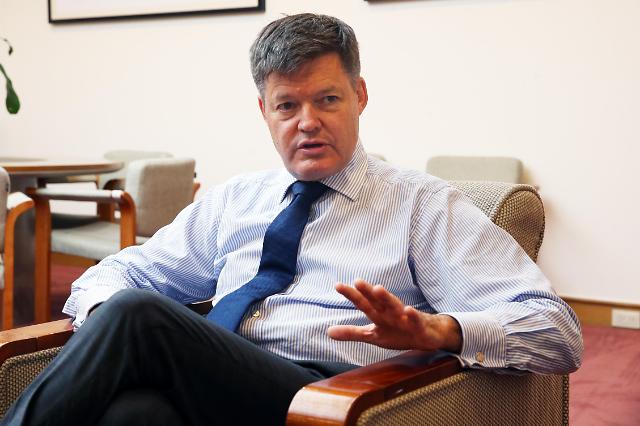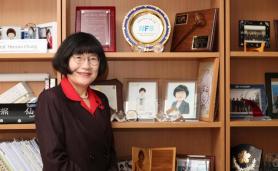
In 2003, Chile became South Korea's first-ever Free Trade Agreement (FTA) partner, opening a new door to the outside world for South Korea which maintained its protective trade stance until the late 1990s when the country was almost swept away by the wake of the Asian financial crisis. Chile was one of four FTA candidates -- Japan, Singapore, Chile, and New Zealand -- suggested by the International Monetary Fund (IMF).
Although Chile is some 18,400 kilometers (11,433 miles) away from South Korea, the South American nation is one of the countries that are recognized by South Koreans as a "familiar country" thanks to high-quality wine and other imported consumable goods. Some $580 million of wine was imported to South Korea in 2020. Chilean pork is also very popular among South Koreans. 314,066 tons of pork were imported in 2020, accounting for about 30 percent of the total pork consumed in South Korea.
Trade data showed that for the last two decades, trade volume between South Korea and Chile has increased by an annual average of about four percent to reach $8 billion in 2022. Chilean exports to South Korea totaled almost $6.2 billion. "Our bilateral agreement has brought enormous benefits to both countries," Mathias Francke, the Chilean Ambassador to South Korea told Aju Korea Daily during an interview on July 21.
Seoul and Santiago are currently undergoing negotiation meetings for the revision of the trade agreement that was signed about 20 years ago. New categories such as work collaboration, intellectual properties, gender equality, labor rights, and environmental issues are being discussed.
"We want to bring into the agreement disciplines that did not exist 20 years ago. Those things are -- the promotion of small and medium-sized enterprises, gender or women rights, the participation of women in the economy, digital issues, and raw and natural resources like minerals," Francke said. The negotiations were kicked off in 2018 but came to a temporary halt soon after because of the COVID-19 pandemic.
"Those issues, energy, for example, that are not in the 20-year-old agreement. So we want to bring them into the agreement. I think it will be good for South Korea and Chile to sit down and look into the agreement and say, well, let's do an assessment, and let's see what we need to make things better," the Chilean ambassador said.
Other than consumable goods, Chile is also the top exporter of copper to South Korea. Chile produced about 5.7 million tons of copper in 2022, accounting for about 29 percent of the total global production. South Korea imported about $3.1 billion worth of copper from Chile in 2022. About $1.5 billion worth of lithium, which is the key material for the production of high-performance lithium-ion batteries for electric vehicles (EVs), was imported.
"75 percent of South Korea's import of lithium carbonate comes from Chile," he said. "20 years ago, nobody thought about lithium and you only used it for medical purposes. Today, we are one of the largest exporters of lithium carbonate," the envoy said. The global need for lithium has skyrocketed during the last decade due to the accelerated global distribution of EVs.
Other than natural resources such as copper and lithium, Francke stressed that there should be more South Korean companies investing in Chile. "Today, Chilean copper, molybdenum, wood pulp, lithium carbonate, fresh grapes, blueberries, and apple juice occupy the first place in South Korean imports. On the other hand, imports from Korea to Chile reached $1.8 billion, concentrated in cars and vehicles, some electronic goods and chemicals," the envoy said, adding that the Chilean government has started to seek for solutions to rebalance the trade volume by cooperating with its South Korean administrative counterparts.
"We seek to start working with relevant Korean ministries, such as the agriculture ministry and the foreign ministry, to introduce Chilean products such as agriculture and sea products that may have potential to South Korean markets while promoting South Korean beef that is very tasty and has great quality, and seaweeds to Chilean markets," Francke said.
Other than trade, Francke said that South Korea and Chile could elevate the current diplomatic relations to a "strategic association" by cooperating in various fields including human rights, gender equality, and issues regarding North Korea.
"Last year both countries celebrated 60 years of diplomatic relations and we did it in many different ways, one of them, elevating those relations to a Strategic Association. The cornerstone of this new step is the fundamental values that we share -- freedom, democracy, the promotion and protection of human rights," the Chilean ambassador to South Korea said.
Regarding military threats and actions taken by North Korea, Francke made clear that Santiago stands with Seoul and will always support the denuclearization of the Korean peninsula while urging for dialogues between Seoul and Pyongyang. Chile also supports South Korea's agenda of the human rights of elderly people and new technologies. "We will also work with South Korea and other partners to improve some areas in this country, particularly on labor issues and gender and women inclusion in various fields," the envoy said.
As the Chilean ambassador to South Korea, Francke will focus on addressing significant problems such as climate change. "It is affecting the way we live, eat, manage our daily lives, and how we develop," he said, adding that he would work with his counterparts in a collaborative manner to share fundamental values and seek solutions.
"My efforts will be put on continue working for a better and stronger bilateral relationship in all areas, working together with the Korean public and private sectors, the academia, with regional and local governments, and especially with the younger generations," Francke said.
Copyright ⓒ Aju Press All rights reserved.




